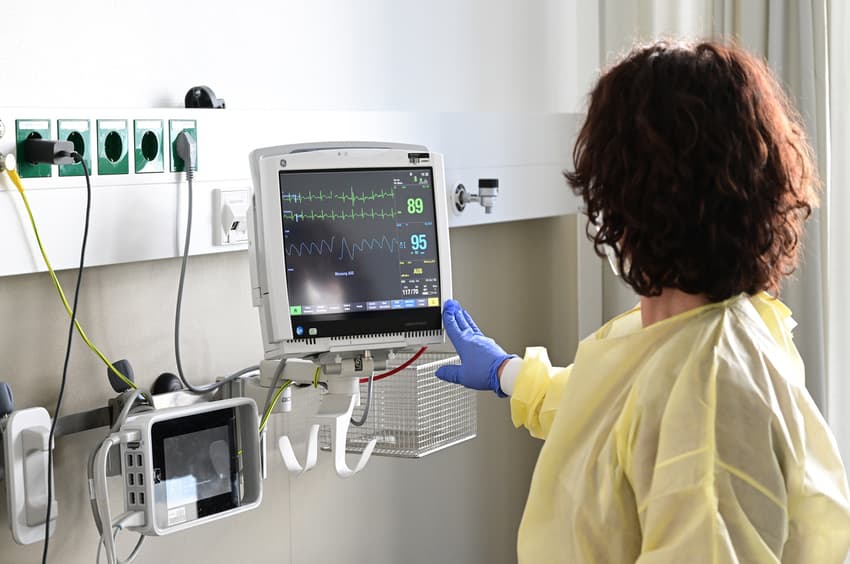Germany's most populous state makes it easier to recognise foreign credentials

North Rhine-Westphalia has introduced measures to help speed up the employment process for foreign workers.
Germany is grappling with a dramatic shortage of skilled professionals. A recent analysis by jobs portal Stepstone revealed that 90 percent of companies are currently unable to find suitable candidates for their vacancies.
In response to this growing need for skilled foreign labour, the coalition government is bringing in a new skilled immigration act - set to come into force in March next year - which will cut red tape and introduce a points-based visa for non-EU nationals wanting to come to Germany for work.
But Germany's most populous state of North Rhine-Westphalia (NRW), which is particularly hard hit by the worker shortage, especially in the health sector, is taking action now.
The state government, led by a coalition of the Christian Democratic Union (CDU) and the Greens, launched a "skilled workforce initiative" in May, aimed at simplifying the immigration process for foreign skilled workers.
READ ALSO: EXCLUSIVE: Germany's new skilled worker law to come into force 'in March 2024'
"The shortage of skilled professionals is one of the greatest challenges of our time," said Minister President Hendrik Wüst (CDU) during a conference in Düsseldorf on May 11th. "We need capable, competent, and motivated individuals in areas such as climate protection, education, healthcare, digitalisation, and infrastructure renewal."
Putting these intentions into practice, the state has now introduced a new regulation, effective immediately, which aims to simply the process of recognising the qualifications of foreign workers. The new procedure clearly defines the documents required from foreign professionals by establishing specific language proficiency requirements, outlining the verification process, and setting out binding rules for language examinations.
Previously, foreign professionals faced significant hurdles, including the requirement to provide evidence of completed training abroad, demonstrate language proficiency, and confirm their medical fitness for work. The lack of standardised tests and clear guidelines for language and health certificates contributed to confusion, uncertainty, and lengthy procedures.
READ ALSO: Surge in foreign workers applying to have qualifications recognised in Germany
In 2022, NRW experienced a significant increase of 21.9 percent in the number of applications for the recognition of foreign professional qualifications compared to the previous year.
Information and Technology North Rhine-Westphalia (IT.NRW), the state's statistical office, reported that the number of applications surged from 10,518 in 2021 to 12,822 in 2022.
75.3 percent of all recognition procedures carried out during that period (a total of 9,654 applications) were for medical healthcare professions. This marked a significant 33.6 percent increase from 2021 when only 7,224 applications in this sector were recorded.
Despite the bureaucratic elements involved, this new regulation represents a significant step towards strengthening NRW's healthcare sector with qualified personnel.
Comments
See Also
Germany is grappling with a dramatic shortage of skilled professionals. A recent analysis by jobs portal Stepstone revealed that 90 percent of companies are currently unable to find suitable candidates for their vacancies.
In response to this growing need for skilled foreign labour, the coalition government is bringing in a new skilled immigration act - set to come into force in March next year - which will cut red tape and introduce a points-based visa for non-EU nationals wanting to come to Germany for work.
But Germany's most populous state of North Rhine-Westphalia (NRW), which is particularly hard hit by the worker shortage, especially in the health sector, is taking action now.
The state government, led by a coalition of the Christian Democratic Union (CDU) and the Greens, launched a "skilled workforce initiative" in May, aimed at simplifying the immigration process for foreign skilled workers.
READ ALSO: EXCLUSIVE: Germany's new skilled worker law to come into force 'in March 2024'
"The shortage of skilled professionals is one of the greatest challenges of our time," said Minister President Hendrik Wüst (CDU) during a conference in Düsseldorf on May 11th. "We need capable, competent, and motivated individuals in areas such as climate protection, education, healthcare, digitalisation, and infrastructure renewal."
Putting these intentions into practice, the state has now introduced a new regulation, effective immediately, which aims to simply the process of recognising the qualifications of foreign workers. The new procedure clearly defines the documents required from foreign professionals by establishing specific language proficiency requirements, outlining the verification process, and setting out binding rules for language examinations.
Previously, foreign professionals faced significant hurdles, including the requirement to provide evidence of completed training abroad, demonstrate language proficiency, and confirm their medical fitness for work. The lack of standardised tests and clear guidelines for language and health certificates contributed to confusion, uncertainty, and lengthy procedures.
READ ALSO: Surge in foreign workers applying to have qualifications recognised in Germany
In 2022, NRW experienced a significant increase of 21.9 percent in the number of applications for the recognition of foreign professional qualifications compared to the previous year.
Information and Technology North Rhine-Westphalia (IT.NRW), the state's statistical office, reported that the number of applications surged from 10,518 in 2021 to 12,822 in 2022.
75.3 percent of all recognition procedures carried out during that period (a total of 9,654 applications) were for medical healthcare professions. This marked a significant 33.6 percent increase from 2021 when only 7,224 applications in this sector were recorded.
Despite the bureaucratic elements involved, this new regulation represents a significant step towards strengthening NRW's healthcare sector with qualified personnel.
Join the conversation in our comments section below. Share your own views and experience and if you have a question or suggestion for our journalists then email us at [email protected].
Please keep comments civil, constructive and on topic – and make sure to read our terms of use before getting involved.
Please log in here to leave a comment.